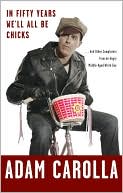Kerplunk!: Stories
Patrick F. McManus's gently comic stories about outdoor life have earned him millions of fans worldwide. With Kerplunk!, McManus delivers a collection of folksy, wonderfully wise depictions of country life worthy of Mark Twain.\ In these tall tales, McManus and his buddies learn how not to net a fish, why you should never get your hair cut by someone who's mad at you, what to do when a deer wanders into camp but your sleeping bag has frozen shut, and how to avoid bird-dog flatulence.\...
Search in google:
This is the latest hilarious collection of folksy, humorous, and wonderfully wise stories about country life from the bestselling author of The Blight Way. Publishers Weekly This gently humorous essay collection by Outdoor Lifecolumnist McManus (The Bear in the Attic) explores hunting and fishing in the Pacific Northwest. As he wryly explains in "The Kind of Guy I Am," McManus's literary persona is an aw-shucks middle-aged married guy with four daughters who dreams of his flies, reels, waders and snowshoes while on vacation with his wife in Venice. Hoping to someday be like Rancid Crabtree, an old man who lives in a "slab shack" against the mountain and does nothing all day but hunt and fish ("The Ideal Life"), McManus and his buddy Fenton Quagmire jettison the high-tech camping gear and attempt to rough it Thoreau-style ("Back to Basics"), with predictably hilarious results. Other tales involve learning how to be patient while fishing ("A Dimple in Time") and enlightening one's fishing partners on how the moon determines the tides ("Where's Mr. Sun?"). McManus narrates his woodsy stories with a laid-back style that will earn many smiles of fond recognition from anyone who's heard a guide say, "I know there used to be a trail here." (Nov.) Copyright 2007 Reed Business Information
Kerplunk!\ The first advice I ever received about fishing was passed on by a teenage ranch hand when I was six years old. As often happened in those days, a spontaneous card party had erupted at the main ranch house one Sunday afternoon, and it was decided by the rancher that everyone should stay for dinner that evening. The fact that the ranch larder had little on hand to feed twenty or so people bothered the rancher not at all. He simply turned to one of the older boys and ordered, "Biff, go catch us some fish for supper."\ To my mind, this was about the same as ordering up a miracle: "Biff, go to the moon and back before supper." My own father, a member of the card party, probably reacted to the order about the same as I did. Dad didn't put on any airs that he was some kind of sportsman, but catching a fish for him was about equal in difficulty to working out the mathematics for Einstein's theory of relativity. (I inherited my father's genes for both mathematics and fishing.)\ Although Biff didn't seem particularly pleased with this assignment, he turned to me and said, "C'mon, Pat, I'll show you how to catch fish."\ It must have been in the spring of the year, March or April, because I recall great, greasy masses of frog eggs in pools of water scattered about the meadow through which the creek meandered. I never did see the actual creek, because it was bordered on both sides by brush considerably higher than Biff's head.\ The fish-catching apparatus apparently was well established at the ranch. Biff stopped by one of the barns and scooped large handfuls of worms out of a box of soil. He put the worms in a rusty can and the can in an old milk bucket. Then we headed out into the watery meadow. Biff hadn't bothered with a fishing rod, and I soon discovered why.\ Leaning up against the brush along the creek every ten yards or so was a slender, peeled tamarack pole. Each was about ten feet long. A line ran from the tip to the butt. A heavy lead sinker was attached to the line. A sturdy leader ran from the line to the hook. The hook was neatly tucked into the butt of the pole. (Please note that I do not dignify these contraptions by referring to them as "rods.")\ Biff undid a hook and placed a bit of worm on it. He then whipped the pole around in a rather graceful arc and sent hook, line, and sinker flying over the brush. (This action was much more difficult to accomplish than it seemed, as I was shortly to find out.) It was then that I received my first bit of fishing advice.\ "Always listen for the kerplunk," Biff said.\ "The kerplunk?" I said.\ "Yeah," he said. "Kerplunk is the sound your sinker makes hitting the water. If you don't hear the kerplunk, your hook may be sitting on a log or hung up on the brush. Your line's not even in the water."\ I have remembered that bit of fishing advice all my life and follow it even to this day whenever I am in a situation that requires me to hurl a baited hook over a wall of brush. Indeed, it is good advice for everyday life: Always listen for the kerplunk. Otherwise, your line may not even be in the water.\ As I recall, the catching of the fish that day was rather tedious and miserable, the weather being wet and cold. Biff baited the hook on each pole, and then whipped the line over the brush. We then walked back to the beginning of the row of poles — I think there were eight or ten of them — and, reversing his maneuver of sending the line out over the brush, he brought it back, with a fish looping through the air and plopping on the ground behind us. Most of the trout we caught seemed to run to the small side, about eight inches or so. (Good, though!) Biff dropped each in the bucket as he caught it. Within an hour and a half we had in the bucket what in those days was described quite accurately as "one heck of a mess of fish." Still, I doubt we were over our combined limit, because the limit for trout back then was twenty-one per fisherman. So we would have been perfectly legal, provided Biff had had a license.\ I think the unofficial limit back then was "all you can catch plus one fish," but even so it was unusual for anyone to reach even the official limit. To say you caught your limit meant something in those days. It usually meant you were lying.\ I remember only one fellow back then who practiced catch-and-release. He was eventually nabbed, I think, and placed in an institution.\ Biff also gave me my second piece of fishing advice: Use a strong leader. I doubt his own leaders could have been used to tow a logging truck out of a mud hole, but they would have served well for most jobs short of that. As I mentioned earlier, I found casting a line over the wall of brush to be much harder than it looked. Several times I cast over the brush and didn't hear the kerplunk on the other side. On these occasions Biff would drag the log or stump or branch or whatever the hook had become attached to back over the brush. Also, I don't recall ever losing a fish because a leader snapped off. So always remember to use a strong leader, particularly if you're fishing with a tamarack pole.\ I started fishing with flies when I was about ten. Later I would learn there is nothing that attracts unwanted advice so voluminously as fly-fishing, but back then my fishing buddy, one Vern Schulze, didn't know any more about fly-fishing than I did.\ If Vern caught a fish, I'd ask him, "What are you using?"\ "A big old gray thing with white wings," he'd reply.\ "Good," I'd say. "I've got one of those."\ There were two flies we actually knew the names of: Black Gnat and Royal Coachman. If someone asked us what our favorite fly was, however, we'd almost always say Royal Coachman, because that sounded so much better than Black Gnat. Neither of us ever caught a fish on the Royal Coachman. Apparently, the fish in our part of the country had never seen a bug that looked even remotely like a Royal Coachman.\ All of our flies were big, too: #10s, and even #8s and #6s. You needed hooks that big in order to get a really strong leader to fit through the eyes. But we seldom lost a fly. Oh, sure, sometimes, when we had to drag a stump or log out of a creek, but it was better than losing a fly.\ I've fished with Vern for more than half a century, and I don't think he has even once given me a bit of advice on how to catch fish. He always catches more fish than I do, so maybe it's just that he doesn't want to reveal any of his secrets.\ Our method of fly-fishing was, first, get the fly in the water. That's it, there's nothing else: Get the fly in the water. If the fly isn't in the water, it isn't going to catch a fish. Even though I have two whole library shelves devoted to fly-fishing, the entirety of my fly-fishing technique, after all these years, consists of nothing more than getting the fly in the water. This fact raises great consternation among my fly-fishing friends and guides. They cannot help but shout advice to me, occasionally with the emphasis of very bad fourteen-letter words. "Keep your rod tip up!" they shout. "Keep the rod tip down! Keep that fish away from the boat! Don't let it get under the boat! Put some goop on your line! Put some goop on your fly! Cast over there! Cast over here! Pump! Pump! Mend your line!"\ My fly casting has been compared by a guide to having the exact same motions as those of an old lady fighting off a bee with a broom handle. I thought that was particularly cruel. One guide even complained that he was afraid my casting was going to upset the boat. Yeah, well, anyone who puts a 5-weight line on a 7-weight rod will cast like that. Try it yourself.\ My response to most of the advice and criticism hurled at my fishing technique is to smile and nod, as though I have just absorbed some great truth. Then I will turn and say, very soberly, "But remember this one thing. Always listen for the kerplunk."\ You see, I know a great many people who have never heard a kerplunk, and therefore never even realize they don't have their line in the water. Copyright © 2007 by Patrick F. McManus
ContentsKerplunk! 1The Art of Trailering 7Silent but Deadly 13Excuses Excuses 19Splitting Infinitives 27Don't Annoy My Inner Frontiersman 33Camping Out with Lewis & Clark 39Strange Meets His Match 45"Uh-oh!" (And Other Things Guides Shouldn't Say) 51The Ideal Life 57A Creek Too Far 63The Perfect Hunt 69Thirty Days 77Where's Mr. Sun? 83The Lucky Guy 89Many Are Called 95A Dimple in Time 101Spare Me the Details (What Are the Odds of a Double Flat?) 105The Haircut 113Bed-and-Breakfast 119Lenny 125The Winter of Eighteen Months 133Christmas Goose 139Peak Experience 147Back to Basics 155People Who Hunt 161For Every Smell, a Nose 167The Ordinary 173The Kind of Guy I Am 179High-Centered (And Other Life Lessons) 185A Look Too Many 191The Eighty 195Performance Netting 201The Pasture 207Predicament 213Dalliance 219
\ Publishers WeeklyThis gently humorous essay collection by Outdoor Lifecolumnist McManus (The Bear in the Attic) explores hunting and fishing in the Pacific Northwest. As he wryly explains in "The Kind of Guy I Am," McManus's literary persona is an aw-shucks middle-aged married guy with four daughters who dreams of his flies, reels, waders and snowshoes while on vacation with his wife in Venice. Hoping to someday be like Rancid Crabtree, an old man who lives in a "slab shack" against the mountain and does nothing all day but hunt and fish ("The Ideal Life"), McManus and his buddy Fenton Quagmire jettison the high-tech camping gear and attempt to rough it Thoreau-style ("Back to Basics"), with predictably hilarious results. Other tales involve learning how to be patient while fishing ("A Dimple in Time") and enlightening one's fishing partners on how the moon determines the tides ("Where's Mr. Sun?"). McManus narrates his woodsy stories with a laid-back style that will earn many smiles of fond recognition from anyone who's heard a guide say, "I know there used to be a trail here." (Nov.)\ Copyright 2007 Reed Business Information\ \ \ \ \ Kirkus ReviewsProlific outdoorsy writer heads back to nature-and elsewhere. Whether producing articles for Field & Stream or delivering another mysterious tale about fictional sheriff Bo Tully, McManus (The Blight Way, 2006, etc.) is always McManus: warm, sharp and above all gently funny. Over the years, he's proven to be at his sharpest when writing about himself, and this collection of columns from Outdoor Life is no exception. A humorist first and a naturist second, McManus here mines the great outdoors for jokes and self-effacements, most of them successful. In the title piece, a succinct fishing primer, he admits that "my flycasting has been compared by a guide to having the exact same motions those of an old lady fighting off a bee with a broom handle." His questionable fishing abilities are further discussed in "Performance Netting," which chronicles an embarrassing day on the lake with his editor at Outdoor Life. McManus is equally amusing when he writes about the great indoors, especially when discussing his friend Fenton Quagmire, who is possessed of a large bank account and a small level of common sense. The author positions himself as the folksy storyteller next door, an observationalist in the tradition of Garrison Keillor, with a touch of Dave Barry thrown in for good measure. The only missteps here stem from the fact that this is a compilation; as such, it lacks narrative arc. Since McManus's tone and delivery are consistently laid-back, the essays can become tedious when read in sequence. Attacked in bits and pieces, however, this is often a rewarding experience. Equally charming when discussing hunting, fishing or canine flatulence, McManus is the kind of guy you'd like to crack open abeer and sit by a campfire with. Agent: Phyllis Westberg/Harold Ober Associates\ \ \ From the Publisher"Golden Voice Dick Hill brings his signature excellence to this amusing collection of essays by Outdoor Life columnist Patrick F. McManus." —-AudioFile\ \








